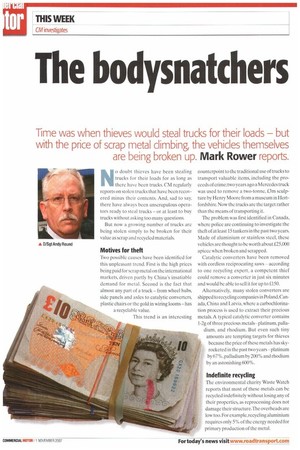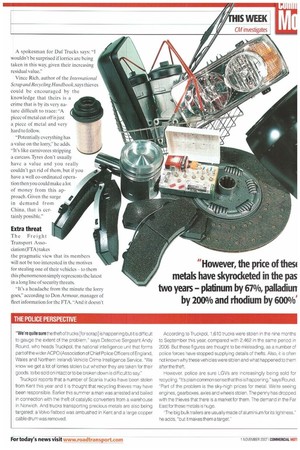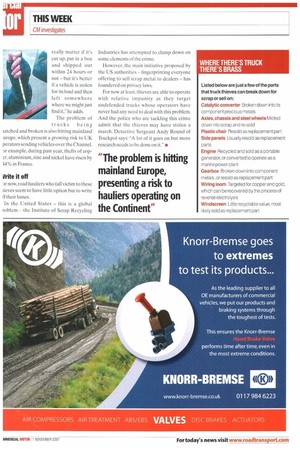The bodysnatchers
Page 28

Page 29

Page 30

If you've noticed an error in this article please click here to report it so we can fix it.
Time was when thieves would steal trucks for their loads — but with the price of scrap metal climbing, the vehicles themselves are being broken up. Mark Rower reports.
No doubt thieves have been stealing trucks for their loads for as long as there have been trucks. CM regularly reports on stolen trucks that have been recovered minus their contents. And, sad to say, there have always been unscrupulous operators ready to steal trucks — or at least to buy trucks without asking too many questions.
But now a growing number of trucks are being stolen simply to be broken for their value as scrap and recycled materials.
Motives for theft
Two possible causes have been identified for this unpleasant trend. First is the high prices being paid for scrap metal on the international markets, driven partly by China's insatiable demand for metal. Second is the fact that almost any part of a truck — from wheel hubs, side panels and axles to catalytic converters, plastic chairs or the gold in wiring looms — has a recyclable value.
This trend is an interesting counterpoint to the traditional use of trucks to transport valuable items, including the proceeds of crime: two years ago a Mercedes truck was used to remove a two-tonne, Om sculpture by Henry Moore from a museum in Hertfordshire. Now the trucks are the target rather than the means of transporting it.
The problem was first identified in Canada, where police are continuing to investigate the theft of at least 15 tankers in the past two years. Made of aluminium or stainless steel, these vehicles are thought to be worth about 125,000 apiece when broken and scrapped.
Catalytic converters have been removed with cordless reciprocating saws — according to one recycling expert, a competent thief could remove a converter in just six minutes and would be able to sell it for up to £150.
Alternatively, many stolen converters are shipped to recycling companies in Poland, Canada, China and Latvia, where a earbochlorinalion process is used to extract their precious metals. A typical catalytic converter contains 1-2g of three precious metals— platinum, palladium, and rhodium. But even such tiny amounts are tempting targets for thieves because the price of these metals has skyrocketed in the past two years—platinum by 67% , palladium by 200% and rhodium by an astonishing 600%.
Indefinite recycling r[he environmental charity Waste Watch reports that most of these metals can be recycled indefinitely without losing any of [heir properties, as reprocessing does not damage their structure.The overheads are low too. For example, recycling aluminium requires only 5% of the energy needed for primary production of the metal. A spokesman for Daf Trucks says: "I wouldn't be surprised if lorries are being taken in this way, given their increasing residual value."
Vince Rich, author of the International Scrap and Recycling Handbook, says thieves could be encouraged by the knowledge that theirs is a crime that is by its very nature difficult to trace: "A piece of metal cut off is just a piece of metal and very hard to follow.
"Potentially everything has a value on the lorry," he adds. "It's like carnivores stripping a carcass. Tyres don't usually have a value and you really couldn't get rid of them, but if you have a well co-ordinated operation then you could make a lot of money from this approach. Given the surge in demand from China, that is certainly possible."
Extra threat The Freight Transport Association (FTA) takes the pragmatic view that its members will not be too interested in the motives for stealing one of their vehicles to them this phenomenon simply represents the latest in along line of security threats.
"It's a headache from the minute the lorry goes,according to Don Armour, manager of fleet information for the FTA."And it doesn't really matter if it's cut up, put in a box and shipped out within 24 hours or not — but it's better if a vehicle is stolen for its load and then left somewhere where we might just find it," he adds.
The problem of trucks being latched and broken is also hitting mainland ttrope, which present a growing risk to UK perators sending vehicles over the Channel. Dr example, during past year, thefts of copr, aluminium, zinc and nickel have risen by 4.4% in France. Industries has attempted to clamp down on some elements of the crime.
However, the main initiative proposed by the US authorities — fingerprinting everyone offering to sell scrap metal to dealers — has foundered on privacy laws.
For now at least, thieves are able to operate with relative impunity as they target undefended trucks whose operators have never had any need to deal with this problem. And the police who are tackling this crime admit that the thieves may have stolen a march. Detective Sergeant Andy Round of Truckpol says: "A lot of it goes on but more research needs to he done on






















































































































































































